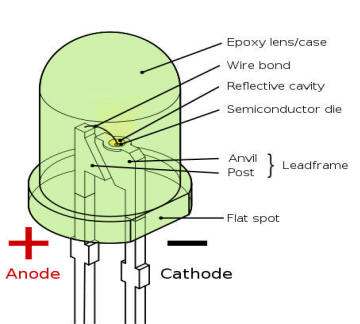



The formula to calculate the correct resistance to use is
where power
supply voltage (Vs)
is the voltage of the power supply, e.g. a 9 volt battery, LED
voltage drop (Vf)
is the forward voltage drop across the LED, and LED
current (I)
is the desired current of the LED. The above formula requires the
current in amperes, although this value is usually given by the
manufacturer in milliamperes, such as 20 mA.
Typically, a LED forward voltage is about 1.8–3.3 volts; it varies by
the color of the LED. A red LED typically drops 1.8 volts, but voltage
drop normally rises as the light frequency increases, so a blue LED may
drop around 3.3 volts.
The formula can be explained considering the LED as a
 resistance, and applying Kirchhoff's
voltage law (KVL)
(R is
the unknown quantity):
resistance, and applying Kirchhoff's
voltage law (KVL)
(R is
the unknown quantity):
![]()
![]()
![]()